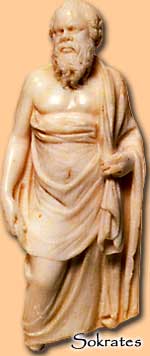 The
writings of many historical contemporary witnesses include records of
vanished islands and continents. Other records, however, doubt the legend of
Atlantis. Today, just as in those days, numerous scholars, scientists and
hobby researchers disagree on the existence of Atlantis. Nevertheless, 2 500
years after Plato’s report they prove the myth of Atlantis to be still alive. The
writings of many historical contemporary witnesses include records of
vanished islands and continents. Other records, however, doubt the legend of
Atlantis. Today, just as in those days, numerous scholars, scientists and
hobby researchers disagree on the existence of Atlantis. Nevertheless, 2 500
years after Plato’s report they prove the myth of Atlantis to be still alive.
Yet who were these people communicating with each other or just mentioned
in the dialogues about Atlantis? And what social positions did they have?
Critias: He is the narrator of the
dialogues about Atlantis and the great-grandson of Dropides II.. Moreover,
he is also Plato’s great-grandfather.
Timaeus: He comes from Lower Italy and
is both a natural scientist and a Pythagorean (member of Plato’s
mathematical guild). At the time of the conversation he was aged 70.
Socrates (470-399 BC): Plato emulated
this Greek philosopher who was also his intellectual leader. It is worth
noting that no records written by Socrates have been found so far.
Hermocrates: He takes part in the
conversation and was a famous strategist. He comes from Syracuse.

Many contemporary witnesses of that age talked and wrote about Atlantis or
similar regions and thus corroborate Plato’s statements. The most renowned
among them are summed up in the following.
| Homer (8th century BC), prior
to Solon and Plato, writes in his “Odyssey“ about the island of
Scheria in the western ocean. Scheria was home of the Phaeacians
who had temples the walls of which were decorated with pure ore
and the mouldings were made of blue steel. The city’s core was
surrounded by a circular wall and there were all sorts of fruit.
Moreover, the city had two springs – no doubt it was a rich
land... In this section of the “Odyssey“ it is almost possible
to reconcile the descriptions of the island of Scheria with
Atlantis. Before Odysseus came to the island of the Phaeacians
he was held prisoner on the island of Ogygia which belonged to
Calypso, a daughter of Atlas. It took an eighteen days‘ journey
from this island to Scheria. Finally, it was Poseidon, assumed
founder of Atlantis, who inflicted these exhausting voyages on
him. |
| Aristotle (384-322 BC), one of
Plato’s students, was the first to criticize the writings on
Atlantis. It was him, however, whose records tell of a huge
island in the Atlantic Ocean known by the Phoenicians as “Antilia”.
As a result, then, he unconsciously agreed with Plato. |
| Proklos (410-485 AD), a
representative of the Neoplatonic philosophy, recorded that
there were several islands west of Europe. The inhabitants of
these islands, he proceeds, remember a huge island that they all
came from and which had been swallowed up by the sea. He also
writes that the Greek philosopher Crantor saw the pillar the
hieroglyphic inscriptions of which told the story of Atlantis. |
|
| Plutarch (46-120 AD) mentions
a continent named Saturnia and an island called Ogygia which are
supposed to be situated a five days‘ journey west of Britain.
These “Islands of the Blessed“ had mild seasons and were assumed
to be the Elysian fields praised by Homer. |
| Diodorus Siculus (100 BC)
writes about a war between the Amazons and a nation called “Atlantioi“.
Located a several days‘ journey from Libya, this empire was
divided among the sons of Uranus, the most famous among them
being Cronus. Furthermore, Siculus reports that this empire was
very wealthy and also had mild climatic conditions. The empire
was named after Atlas, the island’s highest mountain. |
| Isocrates (436-338 BC), a
Greek philosopher, held the view that Plato’s writings embody a
derivation of the Egyptian state system. |
| Poseidonius (135-51 BC),
philosopher and intellectual leader of Cicero, claims that Plato
is right. |
| Crantor (330-275 BC) states
that he saw the scrolls with the story of Atlantis. In addition,
he says that other ancient contemporary witnesses also mention a
huge continent situated in the Atlantic Ocean. It was named
“Poseidonis“ after Poseidon, the god of the sea and patron of
the Atlantic Ocean. |
|
 These
various comments seem to resemble each other in many respects although they
have different origins. In the Mediterranean area, in ancient Egypt, in
Mesopotamia – just all over the world myths and legends of a sunken
continent in the Atlantic Ocean are widely spread and could be real – just
as the legend of Troy as described by Homer in his “Odyssey“ became real.
The very proof that Troy had been found and excavated by the pioneering
German archaeologist Schliemann shows that there is some truth behind the
ancient legends. The following chapters will provide a more detailed account
on this topic. These
various comments seem to resemble each other in many respects although they
have different origins. In the Mediterranean area, in ancient Egypt, in
Mesopotamia – just all over the world myths and legends of a sunken
continent in the Atlantic Ocean are widely spread and could be real – just
as the legend of Troy as described by Homer in his “Odyssey“ became real.
The very proof that Troy had been found and excavated by the pioneering
German archaeologist Schliemann shows that there is some truth behind the
ancient legends. The following chapters will provide a more detailed account
on this topic.
left picture: Plato l. and Aristotle r. –
the first rivals for the topic of Atlantis. However, this is what other
people think.
|